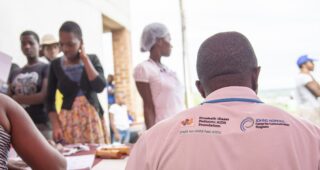Highways, HIV, and Health Care in Uganda
You are here

Savannah Russo observed the work being done by EGPAF partner, Katuna MARPS, a community-based organization in Uganda. Katuna MARPS provides critical education, health care, and support to women who work in the commercial sex industry and other high-risk populations. Follow @savannahlrusso
"The only thing I have acquired from commercial sex work is HIV," Elenia told me.
Elenia works in an isolated spot along the border crossing from Uganda into Rwanda. She is one of thousands of women in Uganda who are driven by poverty and political instability to provide sexual services to truckers, boda cyclists and taxi drivers who travel across the country's major transportation routes.
As a commercial sex worker, Elenia falls into the category of most-at-risk populations (MARPS) — a classification she shares with the mobile populations that traverse the highways and the people living in the communities near transit hubs.
Compounded by political instability, poverty, stigma, and poor access to health care many at-risk individuals suffer in silence. More than one-third of Uganda’s commercial sex workers are living with HIV. But, with an influx of knowledge about the spread of disease among mobile populations this is changing. EGPAF is working with in-country partners, like Katuna MARPS, to prevent the spread of HIV among MARPS.
Since I began this work in July 2014 — through the Global Health Corps Fellowship Program — I have interviewed, photographed, and connected with countless people reached through EGPAF and its partners’ programs and services.
Elenia is one who stands out.
Read the full article on the Huffington Post.
Savannah Russo
General



